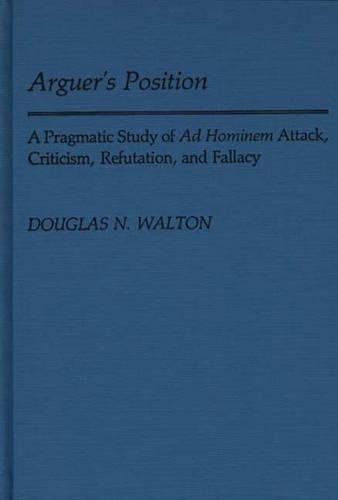
Arguer's Position: A Pragmatic Study of Ad Hominem Attack, Criticism, Refutation, and Fallacy
(Hardback)
Publishing Details
Arguer's Position: A Pragmatic Study of Ad Hominem Attack, Criticism, Refutation, and Fallacy
By (Author) Douglas N. Walton
Bloomsbury Publishing PLC
Praeger Publishers Inc
19th February 1985
United States
Classifications
Tertiary Education
Non Fiction
Philosophy of language
168
Physical Properties
Hardback
346
Width 156mm, Height 235mm
737g
Description
Douglas N. Walton considers the question of whether the conventions of informal conversation can be articulated more precisely than they are at present. Specifically, he addresses the problem of the fallacy of ad hominem argumentation as it occurs in natural settings. Can rules be formulated to determine if criticisms of apparent hypocrisy in an argument are defensible or refutable Walton suggests that they can, and ultimately defends the thesis that ad hominem reasoning is not fallacious per se. He carries his analysis to the core of action--theoretic reasoning--by examining a number of specimen arguments. As suggested by the title, the conclusion of ad hominem argument is demonstrated to be relative to the arguer's position. In the appendixes of the book, articles by Gerald McAuliffe and Gordon R. Lowe illustrate vivid and powerful cases in which Walton's contentions are put to the test.
Author Bio
DOUGLAS N. WALTON is Professor of Philosophy at the University of Winnipeg and is currently a Killiam Research Fellow (1987-1989) of the Canada Council. His writings on various aspects of philosophy, pragmatics, linguistics, ethics, logic, and education have been published frequently and widely since 1971 and include numerous articles in scholarly journals as well as contributed chapters to books. He is the author of Informal Logic and Practical Reasoning and coauthored Argument: The Logic of the Fallacies. He also wrote Ethics of Withdrawal of Life Support Systems: Case Studies on Decision-Making in Intensive Care (Greenwood Press, 1983 and paperback by Praeger Publishers, 1987), Physician Patient Decision-Making (Greenwood Press, 1985) and Arguer's Position (Greenwood Press, 1985). In 1989-1990, Walton will be Fellow-in-Residence at the Netherlands Institute for Advanced Study in the Humanities and Social Sciences.
